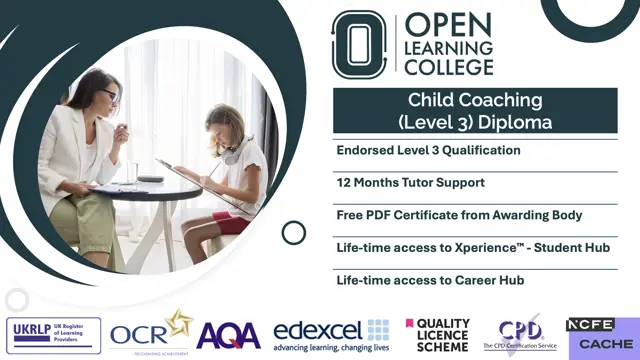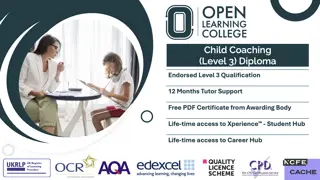
Child Coaching (Level 3)
Distance Learning Course, featuring tutor support and AI assistance, available online or as a study pack option.
Open Learning College
Summary
Funding options available on our website
- QLS & OPA - Free
- Exam(s) / assessment(s) is included in price
- Tutor is available to students
- TOTUM card included in price What's this?
Add to basket or enquire
Overview
Embark on a transformative learning journey with the UK’s most innovative home study provider, offering courses designed to unlock your true potential and facilitate the career change you desire. Access our distance learning courses directly from anywhere, anytime, and acquire industry-recognised Professional Qualifications essential for advancing in your career.
Specifically, explore the flexible and convenient Child Coaching (Level 3) course, an ideal way to gain a diploma qualification. Whether you aim for further education, improved job prospects, or expanded knowledge, this comprehensive course allows you to prepare thoroughly for exams or careers through home study. Plus, it’s structured to be accessible and beneficial even if you have no prior knowledge in Child Coaching.
Child coaching has emerged as a vital field in recent years, offering valuable support and guidance to children navigating the complexities of life. This (Level 3) Diploma course, recognised by ACCPH, provides a solid foundation for individuals aspiring to become child coaches or seeking to enhance their expertise in the domain. Despite its relatively recent formalisation, child coaching draws upon historical precedents spanning over a century, reflecting society’s evolving recognition of the unique needs and challenges faced by children.
The course curriculum delves into various dimensions of child coaching, beginning with comprehensive definitions, standards, and models prevalent in the field. Students explore core principles and concepts crucial for establishing collaborative and positive relationships with young clients. Given the inherent vulnerability of children, the course delves into child development both physically and psychologically, emphasising the dynamics of parent-child relationships and the impact of communication on behaviour shaping and learning.
In contrast to adult coaching techniques, effective child coaching demands flexibility and creativity. Throughout the course, students are exposed to diverse methodologies, including creative mediums and hands-on strategies tailored to engage children effectively. By understanding the nuances of child psychology and communication, aspiring coaches learn to adapt their approaches to suit the unique needs and preferences of each child client.
Endorsed by the Quality Licence Scheme, this Diploma course offers a comprehensive exploration of the child coaching landscape. From understanding the intricacies of child development to mastering effective coaching strategies, students gain a deep understanding of the multifaceted aspects of child coaching. Armed with this knowledge, graduates are equipped to make meaningful contributions to the well-being and development of children, paving the way for a fulfilling career in this rewarding field.
Achievement
Course media
Description
Course Key Topics
the Child Coaching (Level 3) course is divided into 6 modules.
Module 1: Beginnings
The first module introduces child coaching, its uses and contexts. A presentation and discussion of the psychological development of children (up to the age of 18), and integration of relevant physical aspects will be given.
Module 2: How children learn and respond
In order to effectively communicate with children we need to have an understanding and knowledge of how they learn and assimilate what they hear, feel, see and perceive in their world. This module will discuss these processes and it will aid programme design and effective use of appropriate communication models and techniques.
Module 3: Communication and specialist coaching skills
This module deals with listening and congruence; how children react and respond within different contexts and situations. The module will also explore and discuss some of the specialist coaching skills needed when working with children.
Module 4: Special considerations
This module deals with ethical issues when working with children, such as consent, criminal records documentation, professional codes of conduct and working with vulnerable groups. It will also address issues of coaching responsibilities and how a successful collaborative relationship can be built and maintained with children of all ages.
Module 5: Changes
This looks at some of the reasons that children come for coaching. They may be shy and unable to ‘fit’ in with their peer group; they may need to achieve more in terms of education, sport, etc. The reasons for attending may be complex and even involve family situations such as divorce, separation or loss. All these issues will be examined in this module.
Module 6: Consolidation and processes
This brings the whole process together and looks at it from assessment to closure of the programme. In addition some example documents and templates for communication models will be given.
What Will You Learn?
- In the Child Coaching (Level 3) course, participants will delve into a comprehensive curriculum designed to equip them with the knowledge and skills necessary to effectively coach and mentor children.
- This course covers a wide range of topics, including understanding child psychology, communication techniques tailored to children, strategies for building rapport and trust, and methods for fostering resilience and self-esteem in children.
- Additionally, participants will explore various coaching models and frameworks specifically adapted to the developmental needs of children, enabling them to provide personalised guidance and support.
- Through practical exercises, case studies, and real-world scenarios, learners will gain valuable insights into the dynamics of child coaching and develop the confidence to positively impact the lives of children they work with.
Who is this course for?
- The target audience for Child Coaching (Level 3) typically includes individuals involved in child development professions, such as educators, counselors, child psychologists, social workers, and parents.
- These individuals may seek to enhance their skills and understanding of child behavior, emotional development, and effective coaching techniques to support children in reaching their full potential.
- Additionally, professionals working in youth organisations, childcare centers, and community programs may also benefit from this course to better engage with and guide children in various settings.
- Overall, the course caters to anyone passionate about positively influencing the lives of children and adolescents through coaching and mentorship.
Requirements
- The good news is that no prior learning knowledge or experience is essential to take this course. This course is openly available to anyone wishing to learn more about Child Coaching (Level 3) and would like to take part in a highly rewarding distance learning study course.
- We believe that everyone should have the opportunity to expand their knowledge and study further, so we try to keep our entry requirements to a minimum.
- You have the freedom to start the course at any time and continue your studies at your own pace for a period of up to 12 months from initial registration with full tutor support.
Career path
You'll need substantial experience of working with children and adolescents in a social care, health or education setting to work as a child psychotherapist
Questions and answers
Certificates
QLS & OPA
Digital certificate - Included
Open Learning College have undergone external quality checks to ensure that the organisation and the courses’ it offers meet a high standard. Regular reviews of our courses are carried out as part of the endorsement process.
The course depth and study has been benchmarked at Level 3 against level descriptors published by Ofqual.
Visit www.qualitylicencescheme.co.uk for more information.
1. You will receive your accreditation directly from QLS, once you have successfully completed your course (certification fees are included in the course fee).
2. You will receive the Open Pathway Accreditation Diploma (OPA.dip) from Open Learning College.
Reviews
Currently there are no reviews for this course. Be the first to leave a review.
Legal information
This course is advertised on reed.co.uk by the Course Provider, whose terms and conditions apply. Purchases are made directly from the Course Provider, and as such, content and materials are supplied by the Course Provider directly. Reed is acting as agent and not reseller in relation to this course. Reed's only responsibility is to facilitate your payment for the course. It is your responsibility to review and agree to the Course Provider's terms and conditions and satisfy yourself as to the suitability of the course you intend to purchase. Reed will not have any responsibility for the content of the course and/or associated materials.



